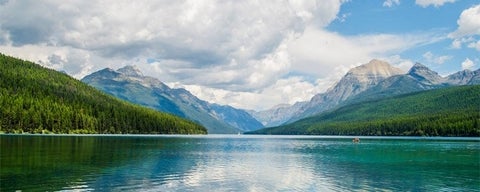Written by special contributor
If you’re in high school right now, chances are you’ve thought about how climate change and the environment will affect your life. Maybe you’ve even thought about making it your career.
Taking action on climate change every day might be the best thing you can do for yourself, your community, and the planet. Let’s look at some of the challenges and industries where a degree in environmental studies will be needed.
Contents
- Industry trends: how do changes in our world impact what's happening in this field?
- Skills to succeed: what skills will help you thrive in the environmental job market?
- Programs to study: what programs does Waterloo offer related to this field?

Demand for “green talent” is booming. LinkedIn reports that listings for jobs related to climate change have increased by eight per cent every year for the past five years. In fact, demand is outpacing the supply of workers. There are green jobs in energy production, manufacturing, construction – but also the film industry, media, and every level of government. Employers are hungry for graduates with green skills – and the transition to a green economy can’t happen without them.
Your career fighting climate change might involve working as an environmental scientist, ecologist, or environmental engineer. You could be a project manager for a clean energy provider. Or you might work as an environment communications professional, helping to keep the public informed and motivated to make change.

A global effort
Governments around the world are proposing innovative policies and making commitments to protect the planet.
The Canadian government declared a climate emergency in 2019. At the 2022 United Nations Climate Change Conference, it signed on to the Net-Zero Government Initiative, signed new pledges to protect Canadian ocean waters and reverse forest loss, and rolled out an international carbon pricing challenge. The United States’ Inflation Reduction Act includes $369 billion in climate investments.
There is a concerted, global effort to make changes that will reduce emissions, negate the effects of extreme weather (heat waves, drought, floods, fire), and work to maintain the health of our land and seas. That effort is transforming international relationship and the global economy. And the changes that have been made are starting to have an effect on climate models.
But there is still an urgent need for more and faster change. That means there’s also an urgent need for people with the skills and ideas to make change happen. Careers in clean energy, environmental science, policy making, and planning are predicted to create up to 24 million jobs in the next decade.

The surge in green energy
Sustainable energy is a keystone of fighting climate change. The rallying cry “electrify everything” sums it up: the world needs to power down fossil fuel consumption and build up wind, solar, and geothermal sources of energy – as well as new forms of nuclear production and waste management.
And the market is responding rapidly to demand. Renewable energy is now cheaper to produce than fossil fuel energy. The need to store renewable energy is pushing research in new energy storage technology and explorations of the ways nanomaterials might be used. Clean energy already employs more people than fossil fuel energy, and that number is still growing. In total, the shift to renewables is expected to create 12.9 million new jobs globally by 2030 – in research and design, installation and management, marketing, communications, and more.

Greening the built environment
Buildings are responsible for almost 40 per cent of global carbon emissions, through construction and operation. At the same time, as the world’s population grows, many parts of the world are facing a housing crisis.
Solutions to both issues will mean changes to how we build, the materials we use, and the ways we design our communities. They’ll include research, development, production, and promotion of low-carbon building materials, standards, and processes that will allow us to create healthier places to live, work, and play. New ways to plan cities, more and better public transit, and bringing nature and food production into urban spaces are all parts of the solution, as well.

Greening tourism and travel
Travel can expand our minds and deepen our sense that we’re all in this together, and that’s important when we’re facing a climate crisis. But the travel industry itself is ripe for a green transformation. You could work on decarbonizing aeronautics and even space travel — see the Waterloo Institute for Sustainable Aeronautics (WISA) – or help the tourism industry move to net zero. Or you could find ways for tourism to support biodiversity, and even help preserve endangered species.
Skills for a career in climate change and sustainability
Technical skills, or “hard” skills, are critical to many careers in the environment. But soft skills like communication will make you stand out, especially early in your career. They’re also important ingredients for advancement. Waterloo’s courses are designed to help you develop these skills — through analytical, hands-on learning and projects that emphasize collaboration. Plus, Waterloo’s world-renowned co-op program gives students lots of practice in real workplaces before they graduate into the job market.
- Knowledge and technical skills. Keeping up with the big picture. There really is a lot of “change” in climate change. Whether you’re an urban planner, environmental engineer, or policy analyst, you’ll need to keep up with current research, industry trends, standards, and legislation around your field.
- Adaptability and flexibility. Many environmental jobs involve fieldwork or temporary relocations, such as wetlands restoration, forestry, or offshore wind development. You may be working (and living!) in unusual environments.
- Collaboration and teamwork. Most jobs in the workforce today involve working in teams. Conflict resolution and organizational skills translate into leadership skills and become even more important as you advance in your career.
- Communication. This one is important for any career. Clear, professional communication pre-empts a lot of problems and helps build strong relationships with clients and co-workers. The ability to convey technical information in simple terms can be especially important in this field. Remember that active listening is half of communication: paying attention, letting a speaker finish, and asking follow-up questions.
Programs to study: So how does a degree become a career in climate change and sustainability?
There are many paths to a climate change career.
If science and technology is your thing, there are bachelor of science (BSc) or applied science (BASc) programs like Climate and Environmental Change, Environmental Sciences, Biology, or Environmental Engineering. Waterloo’s Faculty of Environment is the largest in Canada.
The Bachelor of Environmental Studies degree (BES) blends science with social science, and includes programs like Environment, Resources and Sustainability, Environment and Business, and Geography and Environmental Management.
Plus, lots of different bachelor of arts (BA) programs – Political Science, Communication Studies, Economics, or Waterloo’s Human Rights and Law program, for example – could lead to a career in climate policy, climate communications and outreach, or environmental law.

Here's a list of possible degree programs to explore, listed with a handful of possible job titles for graduates. For many of these degrees, Waterloo’s paid co-op program gives you the chance to test out a job or industry before graduation. Worth noting: for some careers, a range of different degrees could be your first step. The best degree to pursue is the one that excites you the most!
- Accounting and Financial Management, sustainability specialization
- Assurance manager, climate change and sustainability services
- Environmental accountant
- Biology
- Ecologist
- Aquatic ecologist
- Conservation policy analyst
- Environmental scientist
- Chemical Engineering
- Chemical environmental engineer
- Project manager, Natural Resources Canada
- Wastewater engineer
- Chemistry
- Environmental chemist
- Expert technologist, Environment and Climate Change Canada
- Civil Engineering
- Civil engineer, wetlands conservation infrastructure
- Climate and Environmental Change
- Carbon market analyst
- Field technician
- Climate policy analyst
- Renewable energy specialist
- Earth Sciences
- Aerial photograph interpreter
- Climatologist
- Environmental geologist
- Electrical Engineering
- System performance analyst, energy storage
- Solar designer
- Wind operations engineer
- Environment and Business
- Environment, health safety specialist
- Solar logistics and supply chain coordinator
- Environment, Resources and Sustainability
- Program advisor
- Teacher
- Water program coordinator
- Environmental Engineering
- Bioremediation expert
- Climate change adaptation and resiliency lead
- Environmental consultant
- Water resource engineer
- Environmental Sciences
- Pollution control specialist
- Environmental assessment coordinator
- Environmental scientist
- Terrestrial ecologist
- Geography and Aviation
- Transportation environmental protection specialist
- Geography and Environmental Management
- Environmental preparedness and response officer, Transport Canada
- Geological Engineering
- Hydrogeological engineer
- Geological engineer, B.C. Hydro
- Geothermal energy lead
- Geomatics
- Environmental site assessor
- Field surveyor
- GIS technologist, Region of Waterloo
- Honours Science
- Environment, health safety advisor
- Coordinator, Forests Without Borders
- Planning
- Environmental planner
- Landscape designer
- Planner, conservation authority
- Sustainability consultant
- Transit scheduler
- Transport planner
- Science and Business
- Climate change and decarbonization manager
- Renewable energy project developer
- Sustainability and Financial Management
- Assurance manager, climate change and sustainability services
- Environmental accountant
- Environmental, social, and governance (ESG) manager
What's next
- Applying to university? Sign up for tips and advice from current Waterloo students.
- Learn more about Waterloo's faculties.
Related articles

Health care jobs in demand for the future

Bachelor of Sustainability and Financial Management: Exploring career pathways
In the School of Accounting and Finance (SAF) at Waterloo, there are several distinct pathways that you can pursue. Each pathway offers unique prospects for professional growth and development.

Careers for arts students in the age of automation

